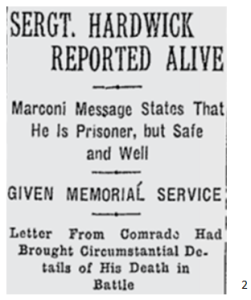Friday, May 21, 1915
Festubert (Indian Village)
The Battalion War Diarist wrote nothing for this day – the RMR War Diary contains no entry this date.
THIS DAY IN RMR HISTORY: In what turned out to be his final communication, this letter from Private Whitby was published in The Ottawa Journal, on May 21st, four weeks after he was wounded and three weeks after he was taken prisoner-of-war by the enemy on April 29th. He died of his wounds in captivity at Keerselaere; the date of death is believed to have been July 13th, 1915.
“Private C. D. B. Whitby, of the Royal Montreal Regiment who was formerly on the business staff of the Montreal Gazette, writes: ‘You ask me what I think of the Germans. I can assure you the Germans are no mean foe. Of course we all know that we shall win in the end, but the struggle will be a tough one, with a still tougher ending, and it is likely to be a long one, too. Some deem that the Germans are poor shots. Believe me that is a fallacy; they are rattling good shots, their troops in the trenches as well as their artillery. For an instance, when we were in the trenches one of our fellows happened to move one of the sandbags on top of the parapet only a little bit. Almost at the same second the bag was riddled with bullet-holes, and our man was more than glad he was well below the sand bag and not above it. The range was a good 100 yards, too!’” [1]
 “After being mourned by a wide circle of friends and being the subject of a memorial service at the Church of the Ascension on Sunday May 9, there is a strong probability that Sergeant Albert V. Hardwick,* of the 14th Battalion is not dead, but is a prisoner of war in internment. His name appeared in the list of casualties sent from Ottawa on the night of May 5 and confirmatory details have since reached Montreal in letters from his comrades. Yesterday, however, the following message timed 3 p.m. London time, was received by Mr. J.H. Lauer, local manager of the Marconi Company, from the London office:
“After being mourned by a wide circle of friends and being the subject of a memorial service at the Church of the Ascension on Sunday May 9, there is a strong probability that Sergeant Albert V. Hardwick,* of the 14th Battalion is not dead, but is a prisoner of war in internment. His name appeared in the list of casualties sent from Ottawa on the night of May 5 and confirmatory details have since reached Montreal in letters from his comrades. Yesterday, however, the following message timed 3 p.m. London time, was received by Mr. J.H. Lauer, local manager of the Marconi Company, from the London office:
‘Hardwick, reported killed, writes prisoner of war; safe and well.’
Sergt. Hardwick, before leaving for the front, was traffic accountant for the Marconi office here, while before coming to Canada, he had a position in the London Marconi office, and is well known to the officials there. The message received is taken to indicate that in writing to the London office he took the quickest possible means of informing his friends, both in England and in Canada, of his safety.
The message that Sergt. Hardwick is alive was all the more surprising in the light of a passage from a letter received from Private William Underwood, nephew of Rev’d L. Flanagan, rector of the Church of the Ascension, of which Sergt. Hardwick was a lay-reader. Private Underwood, writing to his mother, said: ‘Hardwick died fighting like a hero. He stood behind a tree twenty yards from the German trenches, firing bombs. He fell with four bullet wounds, and some of our boys carried him to the road, where he died.’
Sergt. Hardwick was an ex-sergeant of the Victorias, but enlisted in the 14th Battalion as a private. He was made a corporal in England, and was promoted Sergeant of bomb-throwers at the front for merit. A brother, Lieut. Hardwick of the Royal Flying Corps, lost his life by the collapse of his aeroplane. Sergt. Hardwick in 1904 saved the life of an old woman at Finsbury Park station and for this received the Albert medal of the first class.” [3]
* Note: Sergeant Albert Victor Hardwick, No. 25914, was one of 28 members of the 14th Battalion taken prisoner by the enemy on Saturday, April 24th 1915. It was only on July 20th 1915 that confirmation was received that he was a POW, and he was not released from captivity until December 18, 1918.
[1] The Ottawa Journal, Ottawa, Ontario, Friday, May 21, 1915, pg. 6
[2] “Sergt. Hardwick Reported Alive,” The Gazette, Montreal, Quebec, Wednesday, May 19, 1915, pg. 4, col. 4.
[3] Ibid.

